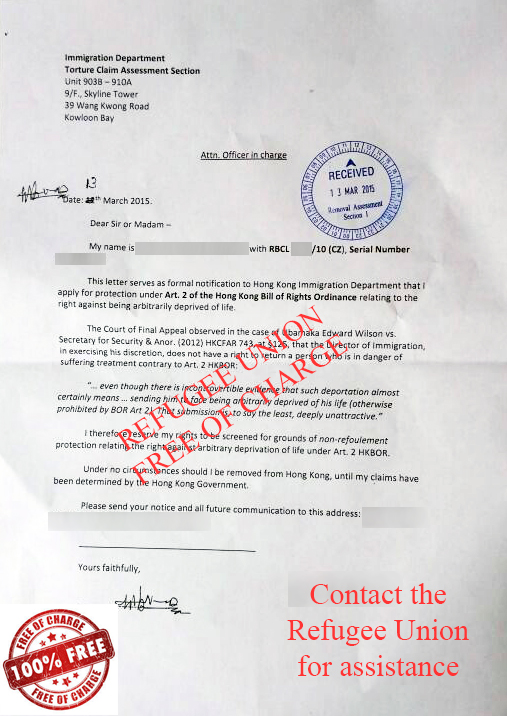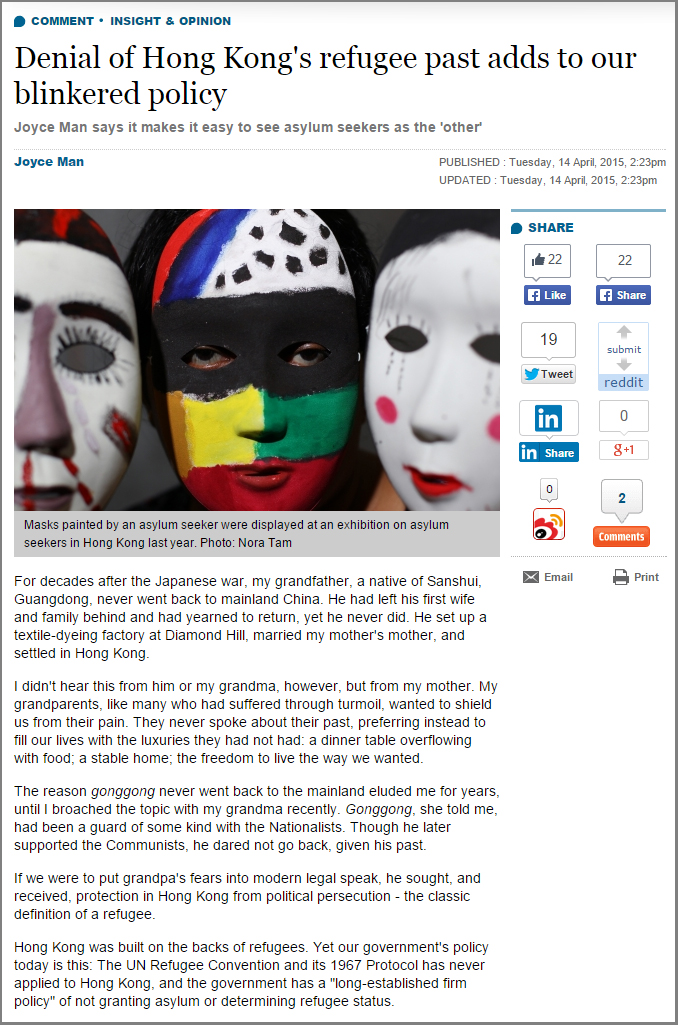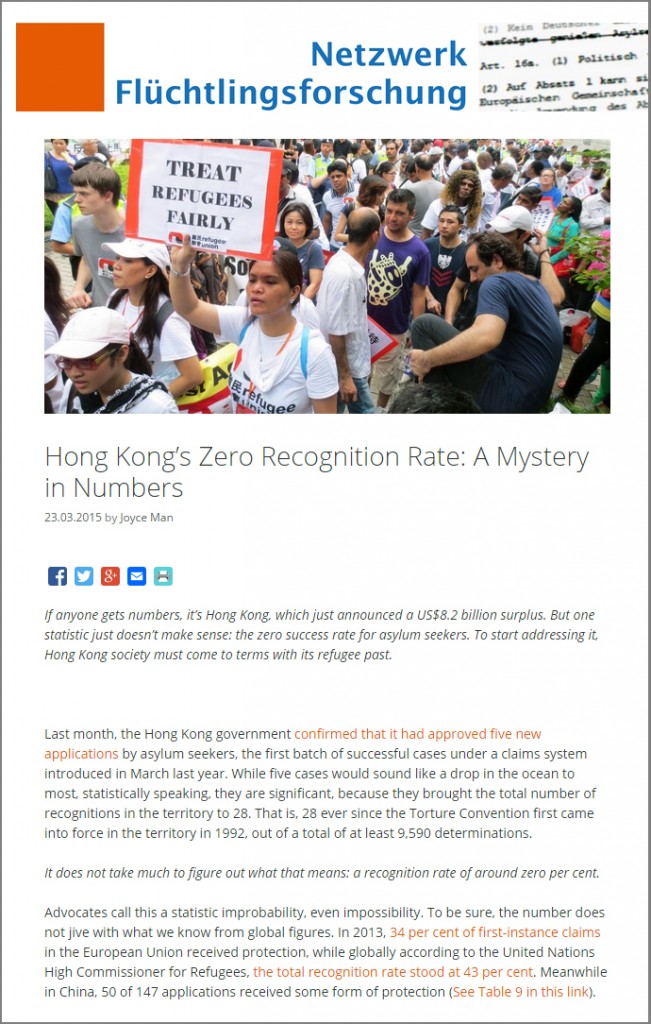Misleading cartoon stokes unnecessary fears
May 18th, 2015 | Media, Rejection, VF Opinion | Comment
The South China Morning Post published this cartoon in its print edition on Saturday, 16 May 2015. The depiction of a refugee tsunami does little to further the understanding of why persecuted minorities abandon their homeland and why neighbouring countries tow their boats back out to sea – rather than offering humanitarian assistance.
In an attempt to counter prevailing myths, we offers a brief extract from “Asylum Seeking and the Global City” (p. 160) written by Mr. Francesco Vecchio, non-executive director of Vision First.
“While the majority of asylum seekers are demonized as abusive illegal migrants and penalized for working illegally, those few who abide by the rules are perceived and helped as the genuine refugees, in turn furthering the legal exclusion of the former.
The lack of agency and constant need of care among the so-called genuine refugees, however, raises public fears about the impact on Hong Kong were the floodgates to be opened, specifically on the official policy of minimal spending on welfare.
Therefore whether they are depicted as a burden or as abusive, deviant characters, asylum seeker typify a new form of socio-legal stratification, at the bottom of which they function as the key means of inducing redistributive benefits and labour flexibility, while at the same time embodying an easy target for public resentment.
A self-fulfilling cycle is thus fashioned, arguably assisting the government to administer and articulate social order through immigration control.”
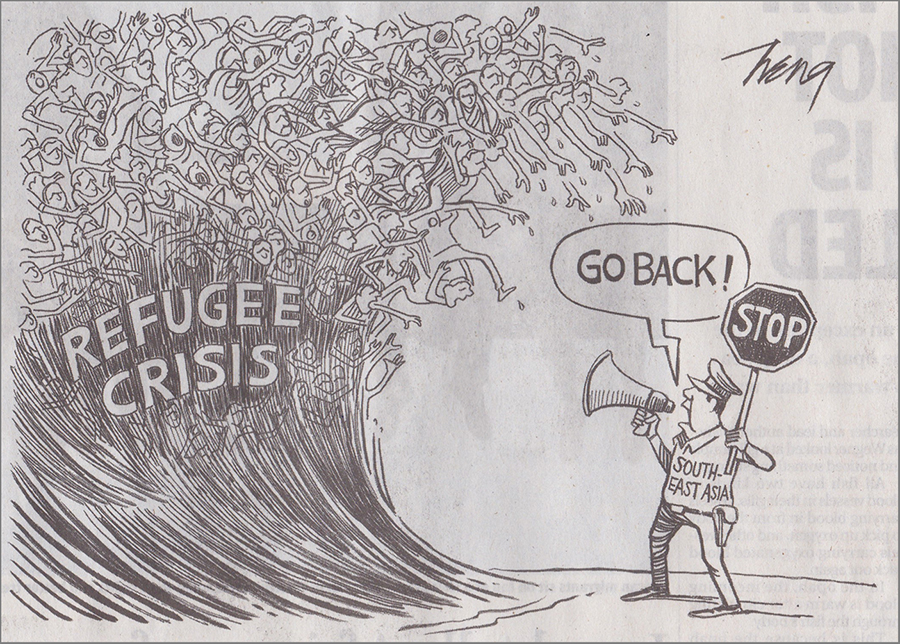
Pro bono legal team enters CIC to secure release of refugees
May 8th, 2015 | Detention, Immigration, Legal, Rejection | Comment
May 6th of 2015 is likely to be a day many refugees detained by the Director of Immigration at the Castle Peak Bay Immigration Centre (CIC) will not easily forget. The Refugee Union had taken instructions from over 30 detainees to arrange a legal visit by a pro bono legal team to advise them on their asylum claims, the legality of the asylum claim procedures, conditions and legality of detention and to secure their release. Since a group visit by a pro bono legal team had not occurred for some time, the refugees were hopeful whilst not knowing what to expect.
The legal team comprised Barristers Mr. Mark Sutherland and Mr. Robert Tibbo, both non-executive directors of Vision First, who scheduled valuable time to provide free legal advice to the detainees, some of whom have indeed been unlawfully detained. Counsel were instructed by solicitors Mr. Tam Kam Tong and Mr. Chris Lucas respectively, who were supported by interpreters – everyone acting on a pro bono basis.
The Director of Immigration had been notified of the legal visit to a number of refugees for the purposes of assessing “current detention at CIC and to advise on possible claims under Article 2 of the Bill of Rights Ordinance.” The legal visit was also to focus on the procedure for judicial review. Led by Superintendent W.S. Kwong, Immigration officers and staff were helpful throughout the particularly busy day.
Sutherland remarked, “There are several refugees who have been locked up since they arrived despite having lodged claims for asylum. In some cases, their interviews haven’t even started. This is clearly a prima facie case of unlawful detention and immediate release has been requested.” Tibbo added, “One youth from South Asian was so traumatized by his treatment by the Director of Immigration at CIC that he gave up and withdraw his non-refoulement protection claim. They are being warehoused in a similar way to Australian off-shore detention camps.”
A sense of encouragement grew among refugees from morning till afternoon. The initial uncertainty about the magnitude of events lifted as the first clients returned to the common rooms to share their experiences. Tibbo observed, “It was like a fire was spreading inside CIC. The refugees knew their lawyers were there and they might be released soon. Clients were coming in to the meeting rooms and everyone was fired up and happy – there was a resurgence of hope that could been seen in their eyes and faces.”
After lunch, while inside CIC, Sutherland came across quite per chance two visitors who turned out to be the Justices of the Peace (JPs) assigned to inspect CIC. JPs are the only independent professionals granted unrestricted access to the centre, where they may speak to detainees without appointment and request copies of detention files. The two gentlemen were clearly alarmed by the grave concerns expressed by Counsel which had arisen out of the legal visit. The JPs kindly held two meetings with the legal team on the same day. They requested a full report of the findings. Interestingly, Vision First was in the process of preparing to make contact with the JP’s Office to seek assistance in relation to detention concerns. Sutherland has since conveyed the matter in writing to the JPs in question.
By 5 p.m., the legal team requested the Director of Immigration to immediately release 6 (six) refugees who have been arbitrarily and unlawfully detained by the Director of Immigration. Their release is expected imminently. It is noteworthy that several refugees on the original list had already been released from detention prior to the legal visit.
It is believed that the legal team’s effort will have an impact on the way certain matters are carried out behind the secretive walls of Immigration detention. It now appears clear that refugees are being unlawfully detained in CIC whist they have outstanding non-refoulement claims.
In reality more than occasional pro bono efforts are needed to ensure high standards of fairness in Immigration detention and to hold the Director of Immigration, Mr. K.K. Chan to account. There should be a panel of lawyers assigned either by The Director of Legal Aid and/or The Duty Lawyer Service to meet this crucial need. These lawyers should be on hand at CIC to offer on the spot legal advice to detainees, regarding their detention and with the authority to launch habeas corpus proceedings, if necessary.
The present lacuna in the provision of free legal advice regarding detention plays into the hands of the Director of Immigration and militates towards longer periods of unchecked, unlawful detention.
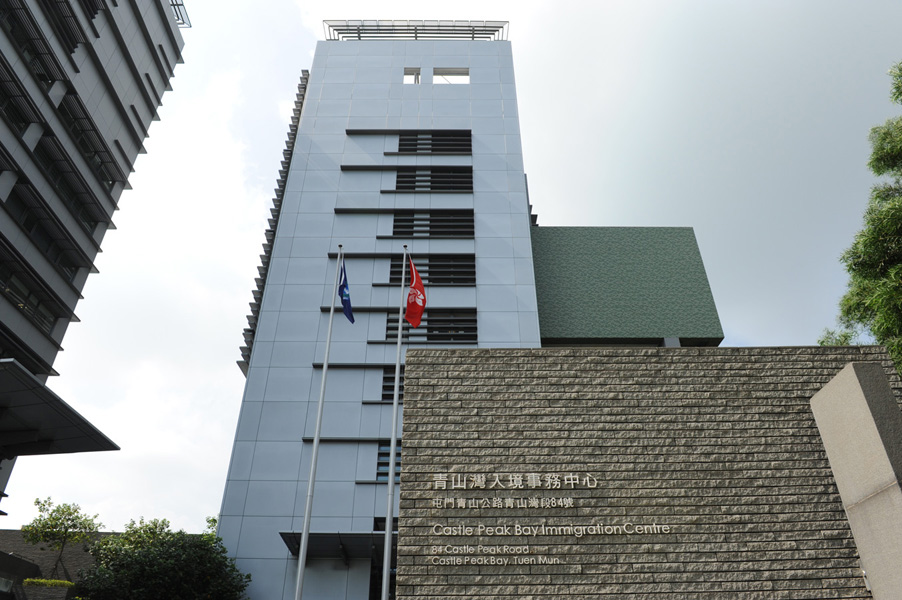
Why is Hong Kong hostile to refugees?
May 6th, 2015 | Detention, Immigration, Legal, Rejection, VF Opinion | Comment
It was hard to answer the question of a visitor to Vision First who sought to understand the caustic environment navigated by refugees with a slim chance of securing protection in an indifferent city. Ironically, Hong Kong has long had a history of welcoming refugees (1.5 million between the 1930s and 1970s), but its sympathy and support of persecuted foreigners dwindled regrettably as residents became richer.
The government mantra is well rehearsed, “Non-refoulement claims lodged under the USM are not asylum claims. The Refugee Convention and its 1967 Protocol have never applied to Hong Kong. The Government maintains a firm policy of not granting asylum to or determining the refugee status of anyone. Our policy objective is to screen … and to remove rejected claimants from Hong Kong as soon as possible. Lodging a claim does not change the fact that non-refoulement claimants are illegal immigrants or overstayers.”
The results of such a policy appear skewed towards removal. Between 2009 and 2014, Immigration screened 5581 claims and substantiated just 25. It is noteworthy that in 6 years Immigration failed to grant protection to a single asylum seeker among 2166 Pakistani, 1760 Indians and 1237 Bangladeshi. Hong Kong has never protected a claimant from these countries. By contrast, in 2013 Australian protection grants produced very different results: Pakistani 80.4%, Indians 6.3% and Bangladeshi 42.7% at first instance (p. 20). Astonishing it is that Pakistani scored 94.9% including appeals (p. 30). How does it compare to Hong Kong’s achievements?
Despite profuse assurances to the contrary, it appears that Hong Kong Government has abdicated its obligation to protect refugees and has instead prioritized rejection and removal. An elaborate performance by 480 lawyers ‘who have received specialised training’ has done little to improve the effective zero percent acceptance rate. To the contrary, the authorities are focused on cost-cutting to reduce the $644 million spent on claimants, including legal aid up 86% last year.
Stringent immigration control and deterrent welfare were ingeniously deployed to deter asylum seekers from remaining in Hong Kong, but their number doubled in 2014 to 9618, reflecting worrying global trends. Immigration is presumably feeling the pressure and this year plans to determine 2000 claims, which might fail to reduce the total ‘with new claims coming in at more than 300 per month since early 2014.’
In an obfuscated environment of rejection and expediency, is it possible that some refugees might be removed or deported to their country of origin at a risk of life and limb? It is hard to make factual assessments, as the Castle Peak Bay Immigration Centre (CIC) remains off-limits to rights advocates and detainees may only be visited by appointed lawyers. Refugees denied release on recognizance are unlikely to enjoy adequate legal advice, or second opinions on their claims.
In this potential black hole, can Immigration be trusted to adhere scrupulously to high standards of fairness, respect fundamental refugee rights and assess claims in a non-adversarial manner as required by law? Acting on a pro bono basis, barristers Robert Tibbo and Mark Sutherland, non-executive directors of Vision First, visited CIC on 6 May 2015 to take instructions from 24 detainees who sought the assistance of the Refugee Union against imminent removal orders. It was reported that 5 had already ‘left from Hong Kong International airport’ with no further details.
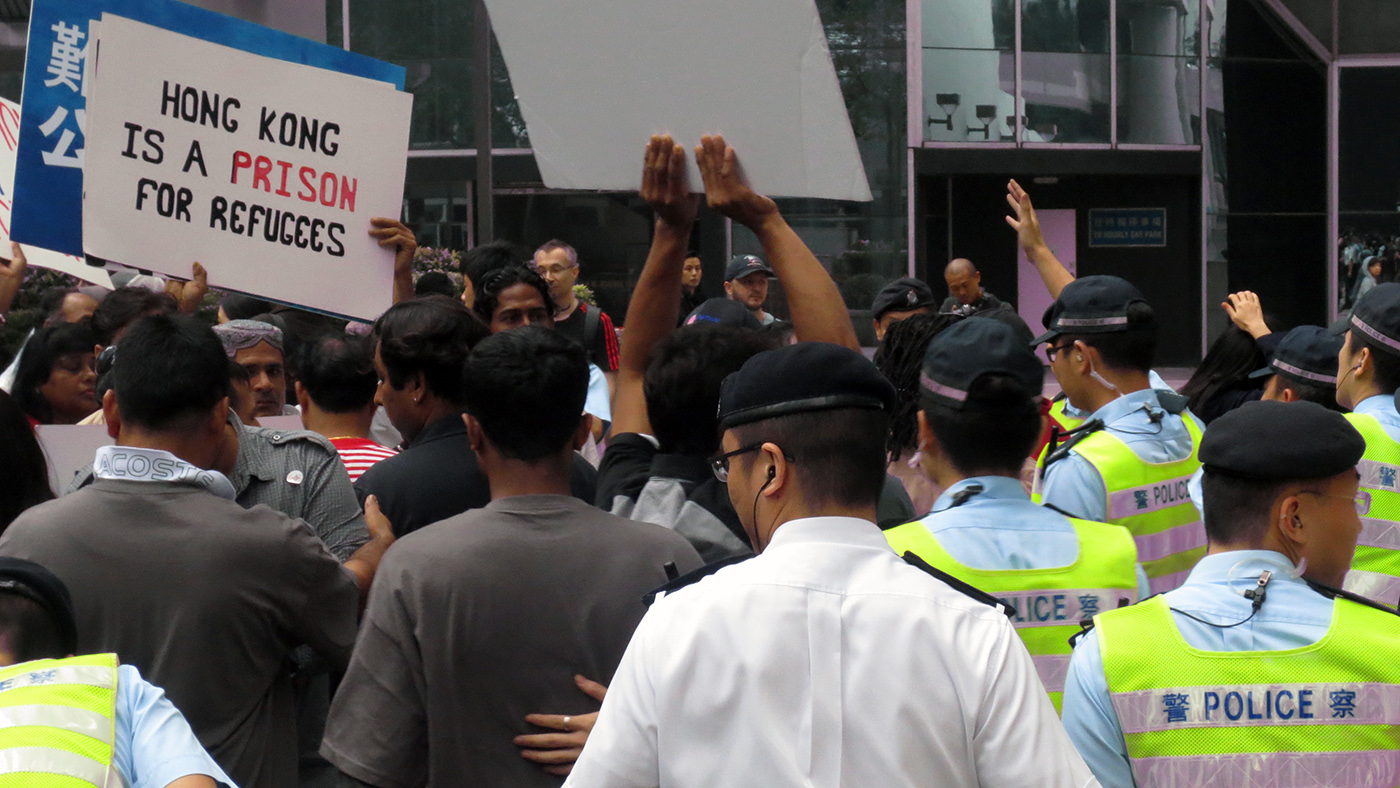
True protection eludes a recognized refugee
Apr 29th, 2015 | Immigration, Medical, Personal Experiences, Rejection, VF Report | Comment
After five years of deep emotional and economic suffering in Hong Kong, on 15 January 2015 Ali was rushed to the hospital with pain in his chest. He recalls, “The medical officer informed me that one of my heart vessels is blocked. They (need to perform an) angioplasty to fix a stent in the blocked vain. But I have to pay 20,000 HK$ myself as the stent is not available from the hospital (free for refugees). I told him that due to my status, it is not possible for me to pay such a huge amount … ISS case worker and UNHCR said sorry that we do not have funds for that purpose.”
Who is Ali? Ali is a 62 year-old recognized refugee from Pakistan in Hong Kong since January 2010. He spent several winters freezing in a container abandoned in a Kam Tin recycling yard. In the summer his home became unbearably hot. Before rental deposits were introduced for refugees, Ali accepted such limited hospitality from residents offering temporary shelter. By living in a possible illegal work place, the Pakistani defied the common assumption that his countrymen abused asylum to work in Hong Kong.
For five years, Vision First followed closely Ali’s asylum experiences in our inhospitable city.
Ali feels betrayed by Hong Kong’s promises of protection, “In January 2010 I left my country, business, mother, wife, children, brothers, sisters, friends and relatives hoping that Hong Kong Government and UNHCR will appreciate our sacrifices in the war against terrorism by opening their hearts and help us in standing again on our feet. But all our expectations were ruined by the different functionaries of the government and UNHCR.”
In May 2011 the Immigration Department rejected Ali’s torture claim at appeal. He was stoically terse, “It is a childish decision!” The rejection by UNHCR in December 2012 was traumatizing, as it crushed his trust in the international agency. When Legal Aid rejected his application to judicially review his CAT rejection, the disheartened family man hit rock bottom. Sick and depressed, Ali seemed on the verge of giving up more than his bid for asylum. In those dark days, only family thoughts kept him going, “I have many burdens with my family. How can I help them? The whole family is looking to me. They are stuck. They want to know when they can come and join me.”
Conspiracists might be forgiven for speculating about the baffling backpedaling by UNHCR which unexpectedly confirmed his status as a refugee on 29 April 2014. It might not be a coincidence that Ali’s lawyers had reversed the Legal Aid decision and prepared a well-document, arguable case that might have forced Immigration to reconsider its decision. Ali suspects that the government put pressure on UNHCR to resolve his claim and stop legal proceedings.
At the time he was hospitalized, Ali was informed that since his condition had not reached a ‘life threatening state’, the hospital could not proceed with free surgery and he would have to pay for the stent himself. Five years in limbo without the right to work dilapidated Ali personal resources. Today he is truly destitute. ISS-HK referred him to SWD which unempathically stated that they would not pay until his condition deteriorated.
Let’s face it. Ali has been treated poorly from the day he arrived and was reduced to living in a shipping container for years. His family was displaced and fell from relative prosperity to grim poverty. Now Ali spends the days bedridden in a room that appears to be an illegal structure. He is afraid his heart will fail overnight. He hardly dares to walk outside for fear of collapsing in the street, which ironically might be the only chance he has to receive the necessary surgery.
Hospitals, ISS-HK and SWD kick away responsibility like a ball. Is it reasonable to ask a sick refugee to raise money himself to save his life despite being granted international protection? What meaning does the status of refugee carry for UNHCR, ISS-HK, SWD and the government? Who will be held accountable in a worst case scenario for such absurd conditions of institutional punitive confinement? Hong Kong should step up and honor Ali’s protection with the peace of mind and wellbeing it ought to entail.
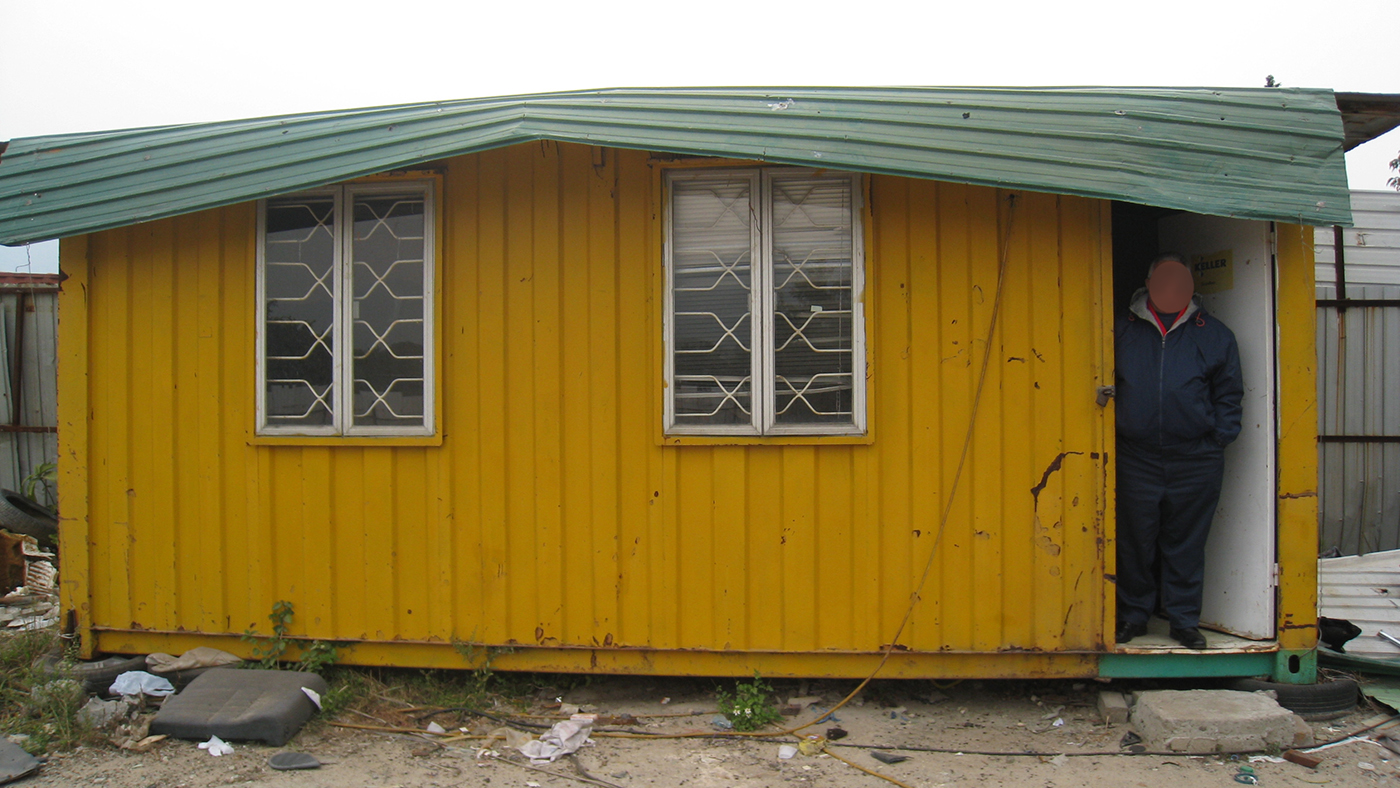
Denial of Hong Kong’s refugee past adds to our blinkered policy
Apr 15th, 2015 | Immigration, Media, Rejection | Comment
Failing refugees has predictable longterm consequences
Apr 7th, 2015 | Crime, Immigration, Legal, Rejection | Comment
Last week the Liberal Party swung its political machinery into action by petitioning the Security Bureau to tighten visa requirements against South Asian countries to prevent an influx of ‘bogus refugees’. The protest followed the arrival at the end of May of 13 Indians on two non-direct flights, who raised asylum claims with the assistance of the same lawyer, an event reported in the press as suspicious.
Media and official commentary asserted that the arrival of these “13 Indians” was indicative of asylum abuse, rejecting them a priori and without due process, as if refugees fleeing overseas in group was an extraordinary occurrence. Instead was this group stereotyped into suspicious and bogus claimants through the juxtaposition of security, legal and immigration interest that expediently branded them as unwanted and potentially dangerous travelers?
The local media focused on selective information: 1) Immigration is processing over 9000 asylum claims; 2) in 2014 over 4000 new claims were lodged; 3) the top three countries of origin are India, Bangladesh and Pakistan; 4) whereby India accounts for 1760 claimants; 5) visa-free entry from Bangladesh and Pakistan was cancelled three and seven years ago; 6) Indians enjoy visa free entry for periods not exceeding 14 days.
Immigration supported the media coverage ‘admitting that many people abused’ the Unified Screening Mechanism launched in March 2014 following court requirements that cruelty and persecution claims be assessed as well as torture. Immigration produced this data in support of asylum abuse: 1) 166 claimants were arrested in 2014 for working illegally ‘because work is more lucrative than in their countries’; 2) 738 claimants were arrested for theft, assault, drugs and other offenses in 2014; 3) Indian asylum claims rose from 26 a month in 2013 to 75 in 2014; 4) the average asylum claim takes 2.7 years with the longest taking 11 years; 5) asylum claims have risen almost 3 times in the past four years.
An extensive analysis of newspaper article is beyond this blog, though three notable issues deserve being drawn into focus. First, these commentaries say nothing about the unsatisfactiory evolution of asylum policies since 1992 which generated confusion without establishing credible, transparent and expert-driven determinations that truly met high standards of fairness. Over the years, four landmark court rulings caused seismic policy shifts and significant delays which might be worsened by impending “Right to Life” claims under Art. 2 of the Bill of Rights.If past performance is an indication of future results, targeted exploitation of a porous system should not be surprising.
Second, the agency of refugees has been seriously undermined by the administration wrongly, but perhaps intentionally, homogenizing their motivation to escape life-threatening situations with that of irregular migrants primarily motivated by voluntary economic imperatives. In the public discourse an overlap exists between the legal status of asylum seekers, treated primarily as overstayers, and illegal immigrants, a confusion that blurs the boundaries normally defining these two categories.
Third, reflective consideration should be given to the laws, administrative policies and social norms that construct the exclusion spaces in which refugees are compelled to make a living without work rights or adequate welfare assistance. Within this optic, it is neither arduous nor commendable for law enforcement to intercept refugees in construction sites, illegal workshops, underground factories and recycling yards where they scrape an unenviable existence. Should 10,000 claimants abide strictly to laws and policies by panhandling on Hong Kong streets?
This highlights the need for an analysis of the reason why refugees expect to earn a living, in part as a way to regain a sense of self-respect lost during flight. Refugees hope to assume a productive role in society and thereby to improve their wellbeing and social and economic status. As one African refugee remarked, “In Hong Kong I have safety, but I don’t have a good life, because a good life is when you work on your own.”
Are refugees a genuine treat to Hong Kong’s security, stability and prosperity, or does the administration need to reconsider and reformulate a questionable asylum process?
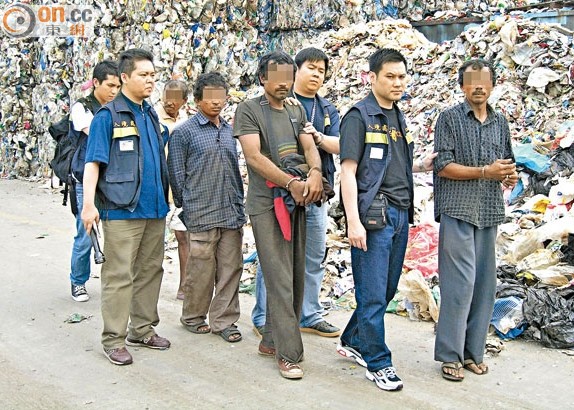
Government Expenditure For Claimants Is Over $600 Million
Mar 30th, 2015 | Immigration, Media, Rejection | Comment
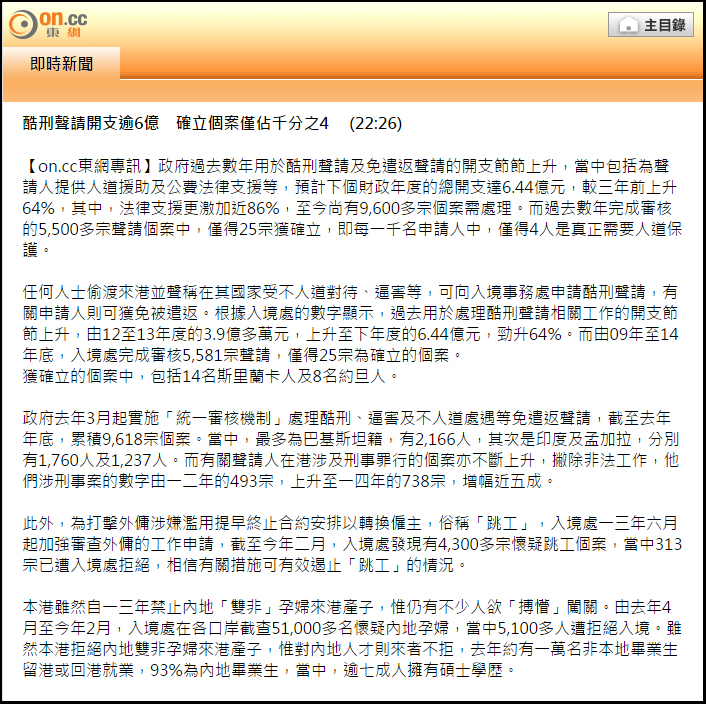
Immigration deploys heavy hand against pregnant woman
Mar 26th, 2015 | Detention, Immigration, Personal Experiences, Rejection | Comment
A 32 week pregnant former domestic worker reported to Vision First that in March 2015 Immigration officers used heavy-handed tactics in an attempt to remove her from Hong Kong International Airport.
Through sheer determination she scored a victory against state machinery that presumably safeguards border integrity with due regard to human rights.
Fitrini (not her real name), 28, was terminated by her Chinese employer when she was two months pregnant, despite discrimination against expectant women being outlawed in this cultured and sophisticated city. She recounts, “I read my contract and nothing said that I could not get pregnant. He didn’t have the right to terminate me. My agency said that they could not help.”
Fitrini fell pregnant with her South Asian boyfriend who supported her throughout the ordeal as they sought a way to stay together. They still plan to marry in the future, “after we find a solution to our problem because after my visa expired I had to leave Hong Kong.” They are in love and wish to raise their child together “if Immigration gave me a chance to stay here,” the mother explained.
In an attempt to stay legal, Fitrini went first to Macao for one month. Upon her return to Hong Kong she was questioned by Immigration and eventually granted a one week visa, “Because I said I have many clothes and things I must collect before I go back to my country.” She then left behind the city, her boyfriend and her dreams of a happy family.
Fitrini’s Muslim family was furious at her predicament. They felt that an unmarried pregnancy brought unforgivable shame to them. “My family could not accept me. Everyone turned against me because of the baby. I could not stay home, so I decided to return to Hong Kong. I hadn’t done anything wrong and thought that Immigration would give me a chance because my boyfriend was here.”
Fitrini narrated her experience. “I had a good record and I hoped Immigration would give me a visa upon arrival. Instead they refused me to let me in. They asked why I came back and I told them I had to meet my boyfriend. They detained me and warned, ‘This time no bargain’. I asked what does it mean? The said a flight had been arranged and I had to leave Hong Kong”
“I said I could not go back because I had problem with my family and I wanted to see my boyfriend, but they would not listen. [With a pretext] to move me to another office, they took me in front of the plane but I knew what it was and grabbed the cabinet and screamed. There were three female officers pulling me but I grabbed the chairs and screamed as many [passengers] watched.”
“I was 30 weeks pregnant and afraid to go back home. I have to stay in Hong Kong to see my boyfriend who was waiting outside the airport. Why they do that to me? They dragged me to the airplane three or four times and I have to fight with them … I was screaming and kicking in front of everyone. This was very shameful but I had no choice.”
“I did not tell them I understand Chinese. When they talked about getting a wheelchair and tying my arms and legs, I warned that I would make suicide before they put me on the plane. For four days they pressured me and used force. I did not believe that Hong Kong Immigration could do this. After four days they let me use my mobile phone and I called outside. Before they refused me to see the lawyer that came with my boyfriend, but then they agree.”
“I never wanted to be as a non-refoulement claimant, but I had to sign [a USM claim] to get in. I only wanted to see my boyfriend to find a way out for our problem. We have a baby and we want to be together. Immigration said I could not have the baby in Hong Kong. They force me to leave, but I fight with them and in the end they released me.”
This incident sheds light on questionable tactics adopted by Immigration officers to remove a vulnerable and pregnant Foreign Domestic Helper considered undesirable and deportable because no longer useful as cheap domestic labour, despite Hong Kong’s ostensible support of human rights.
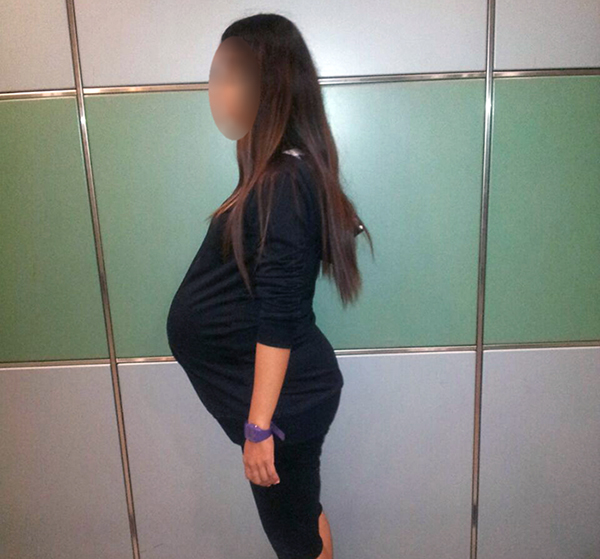
Hong Kong’s Zero Recognition Rate: A Mystery in Numbers
Mar 24th, 2015 | Immigration, Media, Rejection | Comment
Director of Immigration violating Refugee Constitutional Rights inside CIC
Mar 24th, 2015 | Detention, Immigration, Rejection, VF Report | Comment
Vision First is alarmed at news from detainees in Castle Peak Bay Immigration Centre, Tuen Mun (CIC). It is reported that the Director of Immigration may have failed to respect the importance placed on the non-derogable and absolute “Right to Life”, as enshrined in the Hong Kong Bill of Rights Ordinance that is binding on all government authorities.
On 23 March 2015, Vision First wrote an open letter to the Director of Immigration, inquiring among other issues about particulars of the training of officers charged with processing “Right to Life” claims. The Court of Final Appeal held that the right to freedom from being arbitrarily deprived of life also applied to persons not having the right to be in Hong Kong, including refugees.
The right not to be arbitrarily deprived of life (i.e. extra-judicially killed) is fundamental and absolute. It is a universal human right that cannot be limited, suspended or restricted for any reason, by any person.
Vision First is disturbed by allegations detailed in an email we received from a Refugee Union member who recently visited a detainee. Extracts from the email are as follows:
- CIC Immigration is doing really bad things. Just I come out from there after visiting my friend there;
- He says he already sent the BOR 2 claim form to Kowloon Bay but until now no results;
- There are many people inside who already applied for (High Court) Judicial Reviews (of Immigration Notices of Decision) 6 to 7 months before but still inside;
- In CIC immigration officers denied to accept BOR 2;
- People are inside very upset and afraid;
- They don’t understand what to do;
- They says that if they send letters to anyone those letters are not going out from CIC.
Several refugees confirmed this information. The Director of Immigration may be acting unlawfully in the execution of removal and deportation orders that ought to be stayed when detainees file “Right to Life” claims?
These allegations only deteriorate the already precarious reputation of the Hong Kong Government in the field of human rights, suggesting an ostensible turn towards uncompromising obstinacy that certainly stands at odds with the city’s self-proclaimed liberal and welcoming urban lifestyle.
